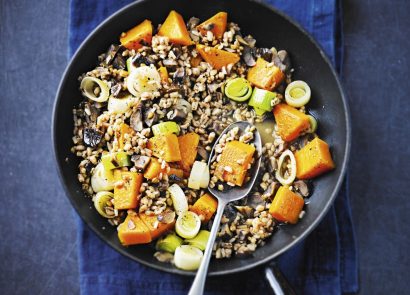While we often associate wrinkles or greying hair with getting older, we can be short-sighted when it comes to our eye health care. Think about it: when was the last time you had your eyes tested? While National Eye Health Week takes place in September, it’s important to look after our eyes throughout the year. At 40, vision can really start to worsen, and there is an increased risk of problems such as cataracts and macular degeneration. Want to read the fine print when you’re 80? Here are our tips for taking better care of your eyes to keep your vision healthy for decades to come – plus we answer some frequently asked questions, such as ‘what can your eyes tell you about your health?’ and ‘what are the best foods to eat for eye health?’. Read on to find out more.
The best foods for eye health
We’ve rounded up foods that are good for eye health that you should be including on your plate.
Oily fish for eye health
The EPA and DHA omega-3s found in oily, fatty fish such as mackerel, sardines and salmon are a soothing sight tonic. “With up to 50 percent of the photoreceptor tissue in the retina of human eyes being comprised of DHA fatty acid, they need adequate levels to function properly,” says registered dietitian and nutritionist, Gretchen Vannice. “Both EPA and DHA omega-3 fatty acids found in fish oil are important for the normal production of healthy eye tear film, and have been shown to reduce inflammation in this area.”
Dark leafy green vegetables
Leafy green veg such as spinach and kale contain a crucial component for healthy eyes – lutein, sometimes known as the eye vitamin. “Both are rich in lutein, an oil-based plant nutrient, which has been shown to reduce damage to the macula [which provides the sharp, central vision we need for reading, driving and seeing fine detail] as a result of exposure to digital screens,” says Gretchen. “Consuming more lutein is also associated with a reduced risk of macular degeneration, better night vision, less eye fatigue, and better adaptability to change in light and glare.”
Carrots for good eye health
If you thought the idea of eating a carrot to help you see in the dark was just a story, think again! “Carrots are well-known to be good for eye health because they contain vitamin A and the carotenoid beta carotene,” says consultant ophthalmic surgeon Ali Mearza. “These nutrients help keep the surface of the eye healthy, and can prevent eye infections and other serious eye conditions. In addition, they’re an essential component for the retinal photoreceptors, which help us see in the dark.”
Apples to beat age-related macular degeneration
“In a time when obesity is on the rise, fruit and vegetables are even more important as they’re also low in calories, which can help maintain a healthier weight,” says Sarah Khweir, spokesperson for the British Dietetic Association and registered dietitian. “For every portion of fruit and vegetable eaten, there is greater protection against heart disease, strokes and cancers. Other health benefits include a slower development of eye disease such as cataracts and age-related macular degeneration, reduced asthma symptoms, improved digestive health, management of diabetes and the potential for improved bone health.”
Try a range of fruit and veg
Taking effective dietary steps to look after your peepers will reduce your risk of developing future eye problems. Foods such as kiwi, spinach, butternut squash, sweet potato, chicory and courgette, which contain the antioxidants lutein and zeaxanthin, help to protect your eyes by lowering levels of inflammation.
Vitamins and eye healthy nutrients
Along with healthy food, there are certain vitamins and minerals to add to your diet to improve your eye health. “A healthy diet high in antioxidant-rich foods can increase your body’s ability to scavenge free radicals and neutralise their damaging effects. Seafood, black-eyed peas, egg yolk and tofu, in particular, are packed with zinc, which can help the body absorb vitamin A, protecting against macular degeneration and night blindness,” says nutritional therapist Mary Van Der Westhuizen. “Some studies have revealed that taking zinc, along with various other antioxidants (beta carotene, vitamin C, vitamin E, and copper), could lower the risk of developing advanced age-related macular degeneration by around 25 percent.”
Eye health check-up
“Eye tests exist for a reason, so don’t ignore any overdue notices!” says Amy Morris, nutritionist at Water for Health. “Not only are they important to assess whether you need glasses, or if your prescription has changed, they can also catch signs of anything more serious. The earlier you detect new changes, the better your chance of treatment and recovery.”
Symptoms of eye conditions
Consultant ophthalmic surgeon Ali Mearza reveals the eye changes that can indicate a more serious eye condition, and when you may need to see an optician for an eye health test.
Blurred vision
If your sight becomes cloudy, you see ‘halos’ around lights at night, or find you have a loss of bright colour vision, cataracts could be to blame. Cataracts tend to worsen gradually over time. They’re not a medical emergency, but you can have surgery to treat them; the surgery replaces your cloudy lens with a customised intraocular lens (IOL).
Your field of view narrows
If your ability to see objects off to the side has reduced, it could be a sign of glaucoma. Left untreated, this can cause a worsening in peripheral vision, which will eventually lead to tunnel vision or even blindness.
If your eyes feel scratched or irritated
Mild redness and aching eyes can suggest dry eye syndrome. This is something that becomes more prominent as we age, as it’s common for your eyes to produce fewer tears and for your tear chemistry to change. Eye drops can help.
Eye floaters and flashes
An increase in floaters is usually caused by a benign, age-related condition called vitreous degeneration or detachment. This occurs when the gel-like interior of the eye liquefies and separates from the retina. However, a sudden ‘shower’ of floaters could be triggered by a serious, sight-threatening tear or detachment of the retina, so, if this is the case, visit your optometrist immediately.




















